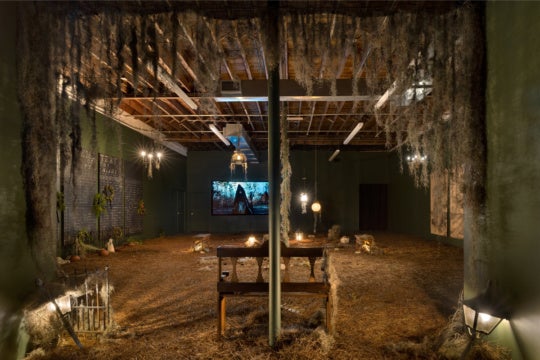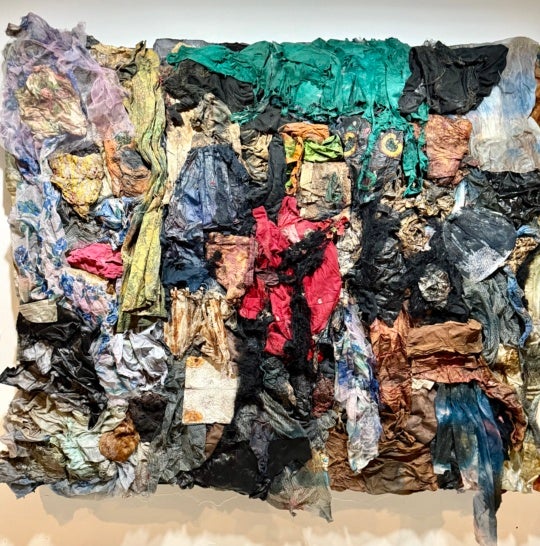[cont.]
Most children are raised with Cinderella and Mickey Mouse, the Cat in the Hat and Charlotte’s Web. At home Maggie only heard Bible stories. Momma would read them to her before bed, after the evening prayer. Miss Tillie, though, read her Greek tragedies. Vengeful gods and goddesses, mothers killing their young sons, women running through the hills ripping up cattle, kings blinding themselves for sleeping with their mothers. It was actually not that different from the Bible where fathers were punished for loving their sons, whales swallowed the faithful to test them, and great plagues descended to punish the evil. The names of the gods changed but the reality of their activity didn’t so much. All gods acted kind of spiteful. “What do you expect, Magpie? Our gods reflect us. Power,” Miss Tillie explained to her, “all behavior is dictated by power. Those who have some want all of it and those that don’t have any of it want to steal some back. Power is the music behind the dance of history.”
They would dance in the living room when her great aunt was sufficiently sloshed. Great arcs of pale floral fabric, swirling around the room, them dipping and stretching, bowing to the gold framed mirrors as they traipsed by. Miss Tillie would spin around, her skirt floating up to reveal the white slip underneath. “Look at these legs,” as Miss Tillie lifted the light silk slip up above her knees. “Look at them, Magpie. Lumpy and bumpy and old. It seems like just yesterday I could do pliés and relevés all day long. Time is such a mean and merciless master, forcing you to endure the husk growing older and older as the nimble core watches on. Inside, you know, I’m limber and leaping, just like you.” Her laugh was a deep one. It seemed to rumble out of her, like a retreating train or approaching thunder. “Here’s what I say to Time,” she said grabbing hold of Maggie’s hand. “Magpie, let’s dance ‘til Time has a conniption!” They danced around and around laughing until neither of them could stand.
Maggie would always cry when it was time to leave. Miss Tillie would offer her a lacy handkerchief and tell her so softly no one else could hear, “Remember what Euripides said: ‘Happiness is brief. It will not stay. Gods batter at its sails.’ It’s our job, Magpie, to savor happiness and shelter the memory of it. No one can take that away.”
Still, it was only when she saw someone wobbling around inebriated that she thought of her Miss Tillie any more. Her great aunt, silk dress and long gloves and a necklace of tiny pink pearls that would bounce as she leaped. Her pearls and hats, the china and mirrors: all of that vanished, the whole house stripped bare, as she lay dying in the hospital, smiling with all the morphine. Maggie told herself that her great aunt died, not trying to save a cat as the gossips told the story, but in imitation of Icarus, trying to fly away in glory.
Twelve
Teresa took off her shoes and stretched out on the king sized bed.
Her mother would hate this place, the fussy folds of the towels, the dark blue velvet swag around the windows, the ornate, gold framed botanical prints. Her mother, however, would abscond with all the bottles of shampoo and conditioners, the bars of lightly scented soap as well – and never use them. When Teresa was cleaning out the house to sell it, she found that the capacious cabinet under the sink was stacked six to ten high with the vials and packets of soap. She had no idea her parents had traveled enough to acquire this many, all in pristine condition, looking old enough to qualify for the Smithsonian collection. She found it interesting how packaging had changed. Most were from the late sixties, early seventies, when cheesy mod styles prevailed. Teresa despised the olive and yellow ocher so prevalent in that era. She found it so ironic that the colors of the bleak cowboy country had become the classic decorator colors favored by suburban housewives like her mother. No child should be forced to have a drab olive and yellow ocher bedroom.
Her cell phone rang but it wasn’t family so she didn’t answer. Tomorrow she would attend to any business. Tonight she just wanted to revel in the success of the exhibit, in the genuine pleasure her friends and gallery director took in her new work. So very nice to hear so many compliments.
This was definitely the best response to her work so far in Los Angeles. When she was just out of grad school, she’d been included in a group show in LA. The show had even received a review in the LA Times. The critic wrote with trenchant “wit” that hers was a classic example of soccer mom art and she should do herself and others a favor, abandon art and find fulfillment as a mother and wife. The review shocked everyone who read it with its viciousness; and for five years she painted furtively, showing her work to no one. She continued teaching the seventh grade and avoided exhibiting until her daughter started high school. By that time she was doing erotic paintings which her husband thought were a bit too risqué. He, however, indulged her. Indulgence is different than support. He never said he liked her work, never asked questions about it, never promoted it to his friends. He never came to her openings. But, unlike the husbands of other women she knew, he did not denigrate it in the company of their friends, did not tell her she was wasting her time, castigating her for not having dinner on the table at a set time. In fact, her husband had taken over cooking after becoming obsessed with chef competitions on The Food Channel. Art and food magazines now mingled in the living room. This passion of his roughly coincided with her first solo exhibit in a modest new gallery in San Francisco opened by an old classmate. She received no reviews but sold two small pieces. The collector, kind of famous in San Francisco, invited her over for a dinner party to celebrate the purchase. Most artists spend their lives waiting and hoping to find a collector of his caliber who understands and appreciates their work. The reality was pretty funny. The collector was completely startled and more than a little miffed when she arrived at his dinner party – set for a “party” of two – accompanied by her uninvited husband who spent the entire evening discussing spices and styles of presentation for each dish served. The more her husband commandeered the conversation, the angrier the collector became. It was a short evening out. As she and her husband walked down the cobbled road to their car parked at the bottom of the hill, they couldn’t stop giggling. It was so obvious that this guy bought the work so he could hump her. Might as well laugh about it, she thought. Otherwise it’s just too depressing for words. Her husband kissed her at the car door, “Who can blame him for leering? I think you’re beautiful too.”
“If you think leering is such a compliment, why do the cat calls you get in the Castro district make you uncomfortable?” she asked him.
“Touché,” he said.




